
State Rep. Robb Greene, R-Shelbyville, poses for a photo with his son RG, who has Autism Spectrum Disorder, last year at the Indiana Statehouse. Greene has been vocal about his opposition to changes in state Medicaid reimbursement rates for Applied Behavioral Analysis, or ABA, therapy, which his son has used.
Submitted photo
After changes to Indiana’s Medicaid reimbursement rates for a common type of autism therapy, a local lawmaker’s bill would require officials to create a report showing the new rates’ effects.
State Rep. Robb Greene, R-Shelbyville, has authored House Bill 1156, which would require the Office of the Secretary of Family and Social Services to prepare and submit a report to certain entities on the effects of Medicaid reimbursement changes to the applied behavior analysis services. This report would include a summary of the changes made; the number of claims for Medicaid recipients of the services per month and throughout a Jan. 1, 2023, to Oct. 1, 2024, reporting period; the number of providers approved under Medicaid to provide the services; and more.
The report would be given to the Medicaid Oversight Committee, the legislative council, the Medicaid Advisory Committee and the Services for Individuals with Intellectual and Other Developmental Disabilities task force, the bill’s text shows.
HB 1156 grew directly out of the discussion and debates held last year about the state’s changes to Applied Behavioral Analysis, or ABA, therapy reimbursement rates for Medicaid, Greene said.
When the Family and Social Services Administration, or FSSA, proposed establishing a uniform rate for reimbursement, there was significant public outcry. One organization — Indiana ACT for Families — was dissatisfied with the proposed rates. The coalition of parents, ABA therapists and providers said they feared the new rates would result in a reduction in services for children with autism.
State lawmakers were also concerned, including Greene. More than 40 lawmakers signed onto a bipartisan letter from him sharing the impact ABA therapy had on his son RG, who has Autism Spectrum Disorder, urging Gov. Eric Holcomb to reconsider the cuts and invite stakeholders in for a collaborative discussion on the new rates.
In response to the concerns, the FSSA increased the proposed rate changes in September, with these changes going into effect on Jan. 1. Although the rates were increased from the initial proposal, both Indiana ACT for Families and Greene said they believed the changes didn’t go far enough.
The reimbursement rate is now $68.24 an hour for ABA therapy performed by a registered behavioral technician, and $110.52 an hour for therapy delivered by a master’s level board-certified behavior analyst. FSSA also added a larger reimbursement for administrative overhead costs and more money to cover time that supervisors can’t bill for.
The report created by HB 1156 would look at the data and see how the rate change affected providers and recipients, Greene said.
“My sense was we would know pretty quickly whether this is hurting providers and hurting access,” he said.
Greene hopes the report would show that he was wrong about the effects the changes would have on providers and patients. He hopes it shows that no one has lost access and that the number of providers accepting Medicaid patients remains the same, he said.
“In my heart of hearts … this is one of those rare instances where I hope I’ve been completely wrong,” Greene said. “This is an issue that’s near and dear to me.”
The reimbursement rates are a rare issue where “matters of the heart” and the budget should be completely aligned, he said.
ABA therapy is an intervention process where kids can undergo treatment, graduate beyond it, enter a school setting and find a degree of independence into adulthood. Before ABA therapy, his son was nonverbal. Through the therapy, he began to advocate for himself and acquired life skills before graduating from the treatment. Now he is in public school, Greene said.
The therapy also has the potential to lessen the need for services later on, he said.
“This is an area, like I said, where if you’re concerned about the budget impact with Medicaid, the growth of Medicaid, then this is one area that if there is something that comes out of the report, let’s take a look at it and let’s look at that long-term, and how do we catch these kids early, get them the services, and then lessen that burden on Medicaid down the road?” Greene said.
HB 1156 is not expected to have any fiscal impact, as it is data the agency already has, Greene said. A fiscal impact statement from the Legislative Services Agency indicates this as well.
“It’s a very simple report that allows us to work together and take a look at the decisions the government makes, how that affects real people,” he said.
The bill has been referred to the House Public Health Committee, where a hearing took place on Tuesday morning. It passed out of committee 8-0, with one member being excused from the vote.




